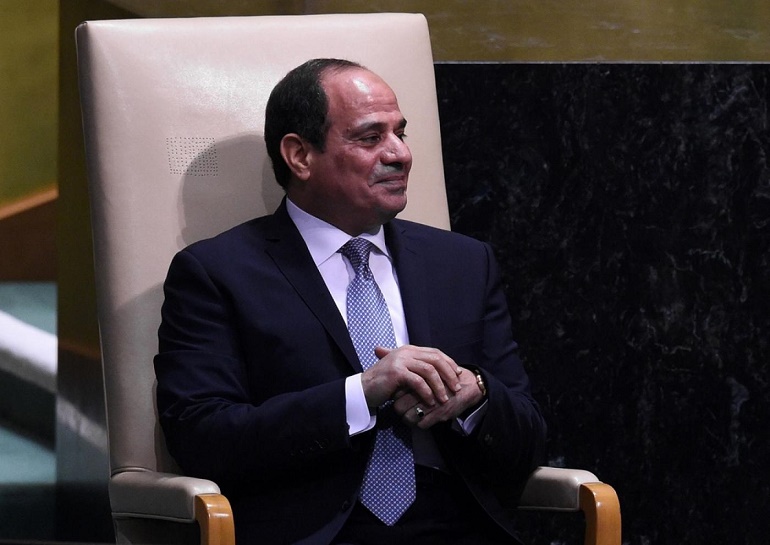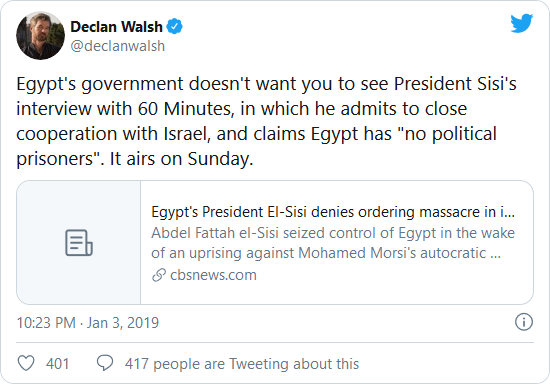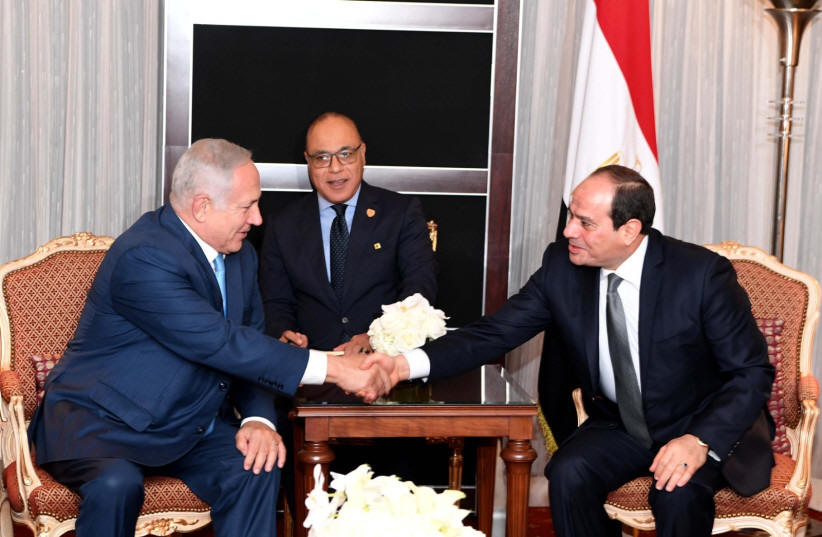
Egypt's Sisi: Military cooperation with Israel at unprecedented levels
Comments were made during an interview with CBS News set to be aired on Sunday
By Anna
Aronheim
The Jerusalem Post,
January 4, 2019
Prime Minister Benjamin Netanyahu met
with the Egyptian President Abdel Fattah al-Sisi in New York
(photo credit: AVI OHAYON - GPO)
Military cooperation between Egypt and Israel has reached an
unprecedented level in the Sinai Peninsula, Egyptian President
Abdel Fattah al-Sisi said in an interview with CBS News which
will be broadcast Sunday.
Asked if security cooperation with Israel was the closest ever
between two countries which were once enemies, he answered,
“That is correct... We have a wide range of cooperation with the
Israelis.”
Israel shares a 240-km.-long border with the restive Sinai
Peninsula, and Cairo and Jerusalem have been reportedly closely
cooperating in the fight against an estimated 1,000 ISIS
terrorists in the region since Sisi rose to power.
Northern Sinai, a mountainous desert between the Suez Canal and
Israel, has been a refuge for Islamist terrorists, with the
peninsula’s main jihadist group, Ansar Beit al-Maqdis, carrying
out several attacks – some deadly – against IDF troops
patrolling the border.
Following Sisi’s rise to power, the group – which pledged
allegiance to Abu Bakr al-Baghdadi and the Islamic State in 2014
– began a wave
of deadly attacks against Egyptian security forces in the Sinai.
Sisi began waging military operations against the jihadists, and
while the terrorist group has lost much of its strength, it
remains active and continues to carry out deadly attacks.
In February 2017, following a massacre of 305 worshipers at
al-Rawda mosque in the northern Sinai city of Bir el-Abd, a
senior Israeli defense official stated that the “relationship
between Israel and Egypt is ongoing. Israel has always been
ready to lend a hand and provide assistance to any country in
the war against terrorism, in this case and in the future as
well.”
According to foreign reports, the militaries of the two
countries meet regularly to exchange intelligence in the fight
against ISIS, and Cairo has given the green light to Jerusalem
to strike the terrorists by air.
In February, The New York Times reported that for more
than two years Israel had been carrying out a full-blown covert
aerial campaign against ISIS terrorists in the Sinai, conducting
some 100 airstrikes by unmarked drones, helicopters and jets,
with Sisi’s approval.
The report also stated that it was “unclear if any Israeli
troops or special forces have set inside Egyptian borders,” as
it would increase the risk of exposure for the two sides which
have remained, until now, mum on the cooperation.
In Israel, the military censor has restricted reports of the
cooperation. Following the interview with CBS’s Scott Pelley,
the Egyptian ambassador contacted the network and requested that
the interview – which also touched on the jailing of Sisi’s
opponents and the massacre of 800 civilians when he was defense
minister – not be aired.
CBS has insisted that the interview will nonetheless be
broadcast on Sunday at 7 p.m. EST/PST.

Egypt's Sisi says military
cooperation with Israel is 'closest ever'
CBS News says Cairo has demanded it not air an interview in
which Egypt president said military cooperation is at
unprecedented levels
By MEE staff
Middle East Eye,
3 January 2019

Sisi also claimed 'there are no
political prisoners in Egypt' despite widespread reports that
the country currently holds tens of
thousands of political
prisoner (AFP)
Egypt has demanded that CBS News not air an interview with Abdel
Fattah el-Sisi, the US
news outlet has said, in which the country's president said
Cairo's military cooperation with Israel had reached
unprecedented levels.
Sisi's remarks appeared to mainly refer to security cooperation
with Israel against armed groups in the northern Sinai.
Asked whether cooperation between the countries could be
described as the "closest ever," Sisi said: "That is correct ...
We have a wide range of cooperation with the Israelis."
In his sit-down with 60 Minutes, Sisi also
claimed "there are no political prisoners in Egypt," despite
widespread reports that the country holds tens of thousands of
political prisoners.
CBS said on Thursday that it had rejected Egypt's demands and
will air the interview on 6 January.
"The 60 Minutes team was
contacted by the Egyptian ambassador shortly after [the
interview] and told the interview could not be aired," CBS said
on its website, where it shared a short excerpt of the
interview.
The news outlet described it as "the interview Egypt's
government doesn't want you to see".
Human Rights Watch, a global watchdog on rights abuses, said
Egypt has about
60,000 people behind bars on charges that range
from spreading fake news to insulting the president.

In May, Amnesty International also said dozens
of political prisoners in Egypt suffer from abuse and torture in
"prolonged and indefinite solitary confinement".
In the 60 Minutes interview,
Sisi says that when he came to power in 2013, following the
overthrow of Muslim Brotherhood president Mohamed Morsi, the
government "tried every peaceful means to disperse" Muslim
Brotherhood sympathisers who protested over Morsi's forced
removal.
In what became known as the Rabaa Massacre, Egyptian security
officials killed as many as 1,000 people, Human
Rights Watch said in 2014.
For years, human rights groups have raised alarms about the
situation in Egypt, which saw a 2011 uprising that unseated
long-time leader Hosni Mubarak and then the 2012 election of
Morsi and his toppling a year later by the military.
The groups say Sisi has presided over a widespread crackdown on
the media, non-profit organisations, human rights defenders and
other perceived critics of his government.
According to Reporters Without Borders, Egypt also ranks in the
bottom 20 countries globally on media freedom.






































